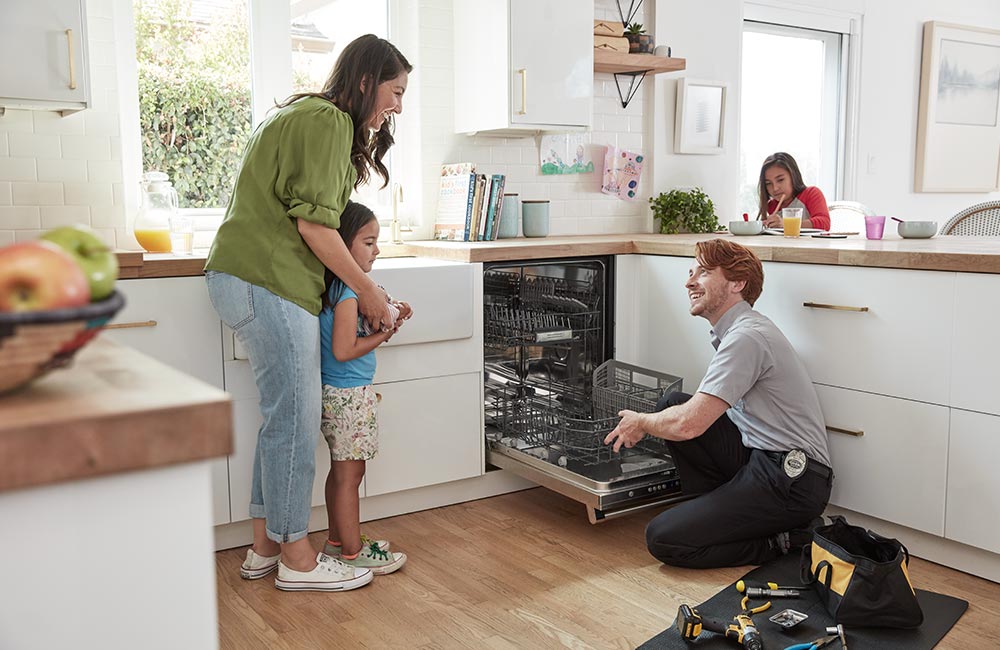A Comprehensive Take A Look At DIY Device Repair for Homeowners
If you've ever faced a malfunctioning home appliance, you know just how discouraging it can be. Understanding common problems and utilizing the ideal troubleshooting techniques can save you money and time. With the right tools and a little bit of knowledge, you may tackle minor repairs on your own. When do you know it's time to call in a professional? Allow's explore the basics of DIY appliance repair work and what you require to keep your crowning achievement smoothly.
Understanding Usual Appliance Problems
When your appliances start breaking down, it can really feel overwhelming, particularly if you're not exactly sure what the trouble is. Common concerns usually emerge with refrigerators, washing machines, and clothes dryers, and recognizing what to seek can conserve you time and stress and anxiety. For example, if your fridge isn't cooling down, inspect the temperature setups or pay attention for unusual noises that might show a stopping working compressor.With washing devices, leaks typically come from worn hoses or defective door seals. If your clothes dryer isn't heating, a stopped up air vent could be the culprit.
Crucial Tools for Do It Yourself Fixes
Having the right devices can make all the distinction in your DIY appliance repair work initiatives. Beginning with a reliable toolset that includes screwdrivers-- both flathead and Phillips-- given that many appliances use these sorts of screws. A sturdy set of pliers is necessary for grasping, twisting, or cutting wires. You'll likewise desire an outlet established for removing screws and nuts that hold devices together.A multimeter is vital for checking electrical connections and detecting problems. Do not forget a degree to assure your home appliances rest effectively, as this can affect efficiency. Take into consideration purchasing a torque wrench for specific tightening needs. Lastly, an excellent flashlight or work light will aid you see into tight or dark spaces. With these devices in hand, you'll be well-equipped to deal with most DIY home appliance repairs with confidence.
Fixing Methods for Appliances
Before diving right into repairs, it is critical to identify the issue impacting your appliance. Begin by observing any kind of unusual noises, leakages, or error codes. Keep in mind of when the problem occurs-- does it occur during details cycles or under particular problems? This can offer clues.Next, consult the customer guidebook for repairing tips. Numerous appliances include a troubleshooting section that could resolve your problem directly. On-line resources, discussion forums, and video clips can likewise offer valuable insights.If you can, do easy tests: for a washing maker, check if the door lock is engaging properly; for a fridge, see if it's preserving the ideal temperature.Lastly, do not neglect to inspect power sources-- guarantee your home appliance is connected in which breaker are functioning. By systematically narrowing down the trouble, you'll be much better equipped to tackle the repair service successfully.
Step-by-Step Repair Guides for Major Devices
While you might feel discouraged by the idea of fixing major home appliances, adhering to a clear step-by-step overview can make the process manageable. Begin by determining the problem-- this might be anything from a fridge not cooling down to a washing maker not spinning. When you've pinpointed the concern, gather the required devices like screwdrivers, pliers, and a multimeter.Next, consult your device's manual for certain instructions and layouts. This resource can be invaluable for understanding how to disassemble and reassemble your appliance safely. Start the repair work by disconnecting the device and removing any panels or covers. Meticulously inspect parts, replacing any kind of defective components as needed.After you have actually completed the repair service, reconstruct the appliance and test it to confirm everything works correctly. Keep a document of your repair work for future reference. With method, you'll gain confidence in dealing with more complicated problems.
Safety Tips for Appliance Repair Work
Before you start any kind of home appliance repair, make certain you're furnished with the right personal safety devices like gloves and safety goggles. Always disconnect the appliance or switch off the source of power to avoid any accidents. Remaining secure is equally as essential as finishing the repair work itself.
Personal Protective Devices
When tackling home appliance fixing, it is crucial to prioritize your safety by using the ideal personal safety tools (PPE) Begin with security goggles to shield your eyes from particles and possible splashes. Next off, wear handwear covers to protect your hands from sharp edges and dangerous materials. Depending on the appliance, you may likewise need a dust mask to prevent breathing in dirt or fumes. Tough shoes is essential, too; select closed-toe footwear to avoid injuries from heavy things. Consider making use of knee pads if you'll be functioning on the flooring for extensive periods. By equipping on your own with appropriate PPE, you'll reduce dangers and concentrate on the job available, making certain a safer and more reliable repair process.

Power Resource Precautions
Guaranteeing that a device is separated from its source of power is necessary for your safety and security throughout repairs (Dependable Refrigeration & Appliance Repair Service Washing Machine Repair). Prior to you begin, unplug the device or shut off the circuit breaker. This straightforward step protects against electrical shocks or accidents. Always verify that the power is off utilizing a voltage tester-- do not depend on assumptions! If you're working with bigger appliances, consider using a lockout/tagout system to prevent unexpected resurgence. Keep your workspace completely dry and free from clutter to decrease dangers. Use shielded handwear covers and use devices with rubber grasps to offer extra security. Ultimately, never attempt repair work in wet problems, as water and electrical energy do not blend. By adhering to these safety measures, you'll create a more secure atmosphere for your DIY repair job
When to Call a Professional

Safety Worries Initially
Taking on DIY home appliance repairs can be rewarding, it's vital to acknowledge your limitations and focus on safety and security. If you come across any kind of indicators of electrical problems, like stimulates or unusual smells, stop quickly and call an expert. Don't attempt repair work entailing gas lines or intricate circuitry unless you're extensively trained. Constantly unplug devices prior to functioning on them, and make use of safety equipment to shield yourself from possible dangers. If you're not sure regarding a repair work or really feel overwhelmed, looking for professional help is the most effective option. Your security is more crucial than saving a couple of dollars. Keep in mind, some repairs can result in significant injury or more damages to your home appliance otherwise handled appropriately. Count on your instincts-- when doubtful, get to out for professional assistance.
Complex Repair Work Issues
When appliances malfunction past fundamental issues, it's typically best to call in an expert. If your refrigerator isn't cooling, your cleaning machine won't spin, or your oven won't heat up, these problems can signal more complex concerns. Trying to deal with these by yourself can bring about more damage or safety and security dangers. You could encounter electrical problems, weird sounds, or leaking fluids that require specialized expertise and tools. If you're uncertain regarding the repair service process or do not have the necessary knowledge, don't think twice to connect for specialist aid. It can conserve you time, cash, and the aggravation of experimental solutions. Relying on a qualified technician guarantees your home appliances are restored securely and efficiently, enabling you to obtain back to your day-to-day regimen.
Service warranty Considerations
Before trying any repairs, it is necessary to examine if your appliance is still under warranty. If it is, you may intend to prevent DIY fixings completely. Making modifications or opening the device could void the guarantee, leaving you in charge of future repair services. Rather, connect to the supplier or accredited service center for specialist help. They typically have trained service technicians that can diagnose and fix issues rapidly. If your device runs out guarantee and you feel positive in your skills, you can proceed with DIY repairs. If you're unsure or face complex problems, calling a professional is typically the much safer choice. Keep in mind, spending in professional assistance can save you time and stop additional damage.
Maintaining Your Appliances for Durability
To ensure your home appliances serve you well for many years ahead, regular upkeep is vital. Beginning by cleansing your devices consistently; dirt and particles can build up and hinder performance. For refrigerators, check the door seals and tidy the coils to maintain them effective. Clean your washing equipment's drum and dispensers to stop mold and odors.Don' t forget to check here check hose pipes and links for leaks or use. For dishwashing machines, run a cleaning cycle month-to-month to verify proper water drainage and get rid of odors.Keep an eye on any uncommon sounds or performance concerns-- attending to these early can avoid expensive repairs down the line (Dependable Refrigeration & Appliance Repair Service Washer repair near me). Refer to your home appliance manuals for certain maintenance pointers and advised service intervals. By embracing these techniques, you'll not just expand the life of your devices yet additionally enhance their efficiency, conserving you money and time over time
Regularly Asked Concerns
What Home appliances Are Most Generally Fixed by Homeowners?
When it concerns DIY repairs, property owners commonly take on washing equipments, dryers, refrigerators, and dishwashing machines. You'll discover these home appliances are most commonly repaired because they often encounter problems and can be convenient with basic devices.
How Can I Locate Device Repair Components Easily?
You can find appliance repair work components conveniently by browsing on-line stores, checking out local hardware stores, or examining manufacturer web sites. Don't neglect to have your device version number useful to assure you get the ideal parts.
Exist Online Resources for DIY Device Fixing Videos?
Yes, there are a lot of on the internet resources for do it yourself appliance repair service video clips. YouTube is an excellent beginning, along with websites like RepairClinic and AppliancePartsPros, which supply step-by-step overviews to assist you troubleshoot and fix your appliances.
What Typical Mistakes Should I Prevent During Fixes?
Throughout repairs, avoid rushing your job, avoiding safety and security preventative measures, or overlooking to read guidebooks. Don't think you understand every little thing; ask for assistance if needed. Always keep your workspace arranged to avoid shedding tools or components.
Just How Can I Inform if a Component Deserves Fixing?
To figure out if a part's worth repairing, assess its price compared to replacement. Check schedule, ease of repair, and whether the home appliance's total worth warrants the effort. If repair work cost more, consider changing it rather.